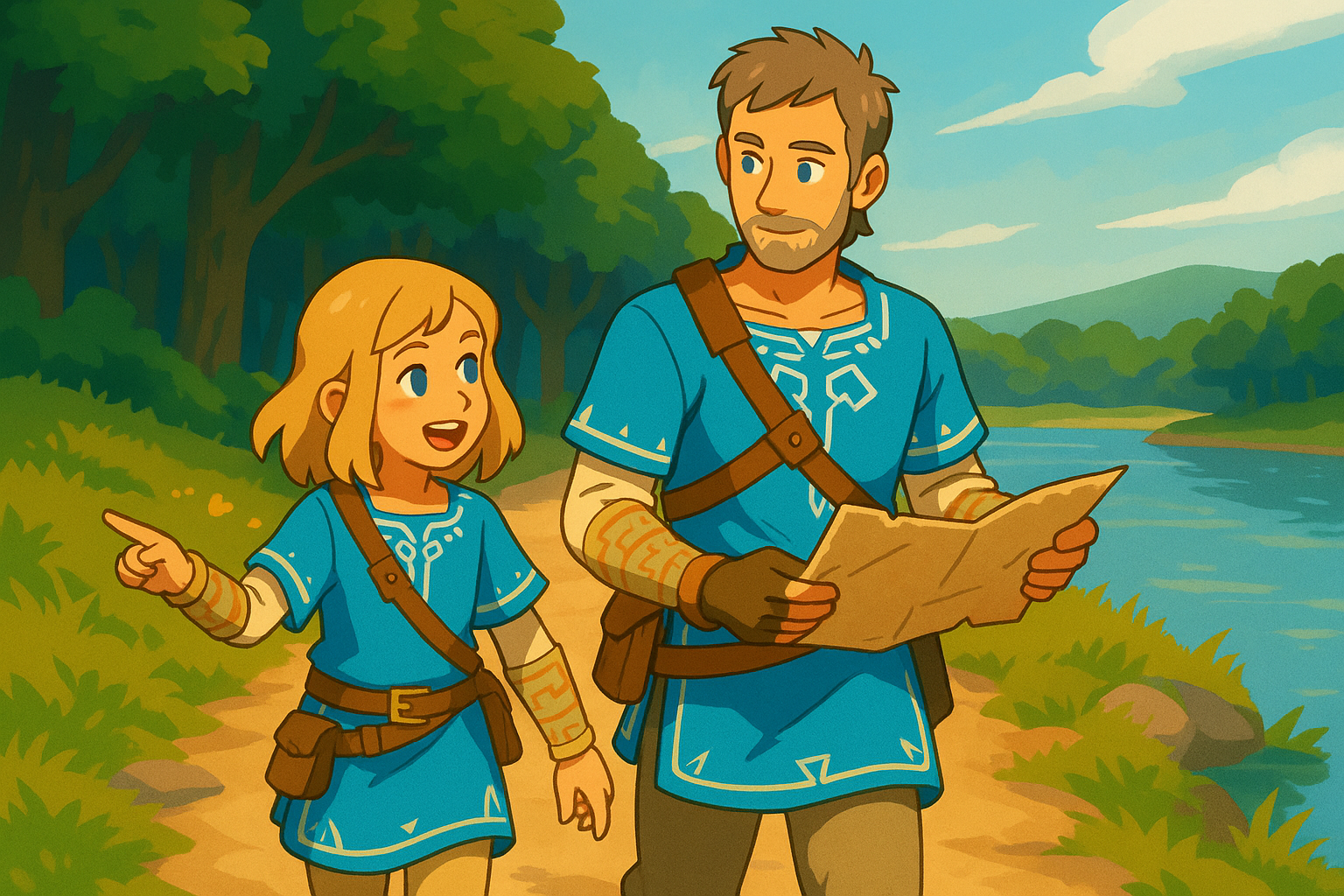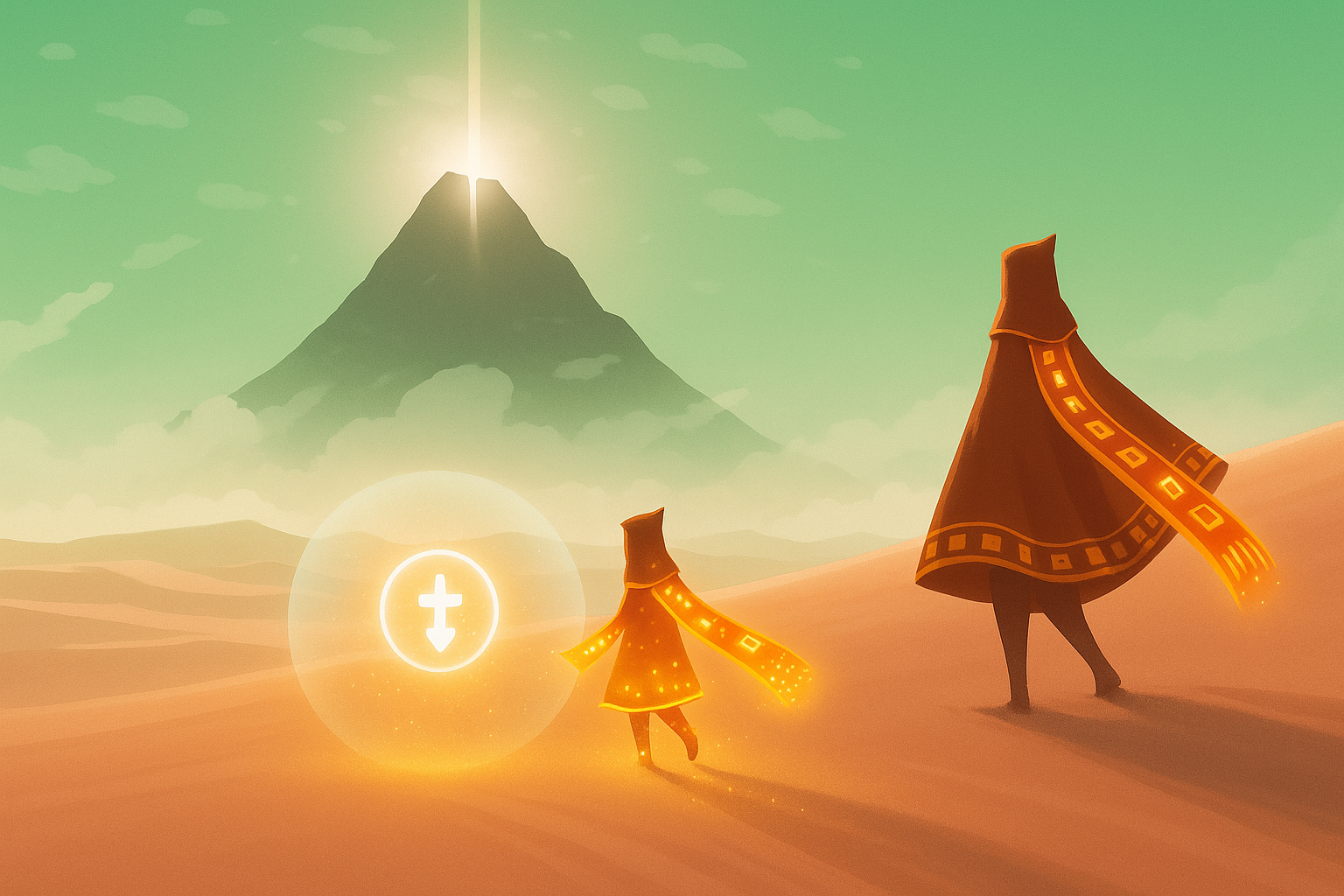Two Players, One Controller
Parenting, play, and the power of shared adventure.

"Hey Dad, can we play Zelda tonight?"
My daughter Lily is eight, almost nine. She's smart, she's curious, and she's a precocious problem-solver. She likes a good puzzle. She loves a good boss fight. She craves a good story.
In short, she's becoming an excellent gaming companion.
She’s not yet skilled with the mechanics of gameplay: the thumbsticks, the buttons, the menus. That's easy to understand, her hands are still child-sized, and she hasn't had 35 years of gaming to develop the muscle memory. So when my daughter and I sit down to games — and currently, that's Zelda: Tears of the Kingdom — the controller is in my hands.
The direction though, that's all her.
She picks the mountain, I do the climbing.
She wants us to cross a broken bridge, I'm the one that sprints and jumps across the chasm.
She tells me to go pick a fight with a pack of lizalfos, I'm the one that swings the sword.
And yeah, she’s the one telling me where to go, what to try, who we should talk to next. “Let’s help the Rito next,” she says. “What happens if we jump off the top of Death Mountain?”
She almost never suggests the optimal path — she asks for the interesting one.
And I follow her lead.
Journey Before Destination

Our first "real" game together was Journey on the PS4.
Journey is a beautiful game. It's a short game, you could probably play through it from start to finish over the course of a single afternoon. You play a vaguely humanoid character, hooded and cloaked, and you start in the middle of a vast desert. There is no exposition, no explicit direction — just a distant mountain crowned with a curious light at the peak. It is clearly your destination.
There is a plot, but the game is entirely non-verbal. And for those familiar with the concept, it closely aligns with Campbell's concept of the Hero's Journey or monomyth — a connection that is made explicit if you peruse the titles of the soundtrack.
Seriously, go listen to the soundtrack. Since the game no words, it carries a heavy load in the narrative development and conveying the story.
She didn’t know the term hero’s journey. She didn’t really even register that there was a story. For her, it was just an adventure wrapped in music and windblown sand. Traversing the desert. Ascending the mountain. She may not have understood the deeper significance, but she felt it. The music moved her. The sweeping visuals pulled her in.
She still asks to listen to the soundtrack in the car. I'm all too happy to oblige.
I know she didn't fully grasp what happened, but that's okay. I didn't either, my first time through, and I was much older then than she is now. Even so, that didn’t stop it from being formative. Journey taught her that games could evoke deep feelings — awe, mystery, loss, wonder. It's alright that she can’t articulate why.
Understanding can come later. For now, it is enough to experience them.
The Fractal Adventure
Zelda is a very different experience.
The world of Hyrule is infinitely larger, and not just in pure physical space. It is wide-open and endlessly explorable, but perhaps more critically, it has a richness to its depth, with characters that make it feel like a lived-in place. Almost every where you go, there is a small vignette for you to discover. Over here is a village. Over there is a small monster encampment. And up that mountain path, there be dragons.
Each session begins with a question: “What should we do today?” There’s no pressure to advance, even though there is a story. Sometimes we build things with the Ultrahand power. Sometimes we climb mountains. Sometimes we just wander through the Depths.
What’s amazed me is how engaged she is — not just entertained, but invested. She tracks the characters. She remembers story beats. She offers theories, guesses, emotions. And she's not always correct, but that also doesn't mean she's wrong. It just means she hasn't had years of experience to train her mind to think along these pathways.
It also means I have to sit on my hands sometimes, and allow myself to go along with her direction. When you've played games as long as I have, it's easy to adopt a min-max attitude, exploring ways to get maximum reward for minimum effort. But with a game like Zelda, that often means you'll miss a lot of incidental storytelling and micro-experiences. And quite honestly, Nintendo has done something tremendous with Zelda, in that there are often multiple ways to accomplish your goals. There have been numerous times when I have wanted to say "No, we can't do it like that," only to find out that yes, you can.
For a game about freedom and discovery, it's become a mirror for her growing ability to navigate possibility.
And for my ability to let go of trying to optimize every step.
Two Players, One Journey
Two people playing a single-player game together isn’t just cooperative — it’s relational.
It requires a special kind of patience, communicating and translating intent, keeping both people attentive and engaged in what we are doing.
I'm the hands. She's the head and the heart.
I’ve started thinking of it as a new kind of co-op: less about combat roles, more about cognitive roles.
She’s the strategist, the storyteller, the compass of wonder.
I’m the executor — the one making it happen.
It’s not lost on me that this is how I often approach life, too. I spend my time thinking, directing, orchestrating. I build systems, design flows, plan projects — and hand them off to others (human or machine) to execute.
In a weird twist though, it's a reversal of my usual role. There's a striking parallel between how she collaborates with me, and how I collaborate with AI.
It’s a curious inversion. When I work with an AI, I bring the questions, I decide what has meaning worth exploring, I choose the direction, and I map the larger arc of what I want. The system fills in the details.
But with her, I am the system — a living interface translating her curiosity into actions on screen.
And it’s beautiful.
Save Game
These moments won’t last forever.
There will come a time when she won’t need me to move the character for her — when her hands will catch up to her heart, and she’ll race ahead through Hyrule on her own.
But for now, I cherish the times when she leans against me on the couch, eyes full of wonder, and I ask the question that speaks to an infinite array of possibilities, but has no wrong answer:
“What do you want us to do next?”
